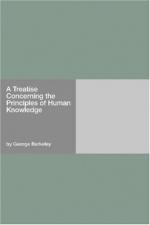151. Objection to the hand of god being the immediate cause, threefold.—Answer.—It will, I doubt not, be objected that the slow and gradual methods observed in the production of natural things do not seem to have for their cause the immediate hand of an Almighty Agent. Besides, monsters, untimely births, fruits blasted in the blossom, rains falling in desert places, miseries incident to human life, and the like, are so many arguments that the whole frame of nature is not immediately actuated and superintended by a Spirit of infinite wisdom and goodness. But the answer to this objection is in a good measure plain from sect. 62; it being visible that the aforesaid methods of nature are absolutely necessary, in order to working by the most simple and general rules, and after a steady and consistent manner; which argues both the wisdom and goodness of God. Such is the artificial contrivance of this mighty machine of nature that, whilst its motions and various phenomena strike on our senses, the hand which actuates the whole is itself unperceivable to men of flesh and blood. “Verily” (saith the prophet) “thou art a God that hidest thyself.” Isaiah, 45. 15. But, though the Lord conceal Himself from the eyes of the sensual and lazy, who will not be at the least expense of thought, yet to an unbiased and attentive mind nothing can be more plainly legible than the intimate presence of an All-wise Spirit, who fashions, regulates and sustains the whole system




